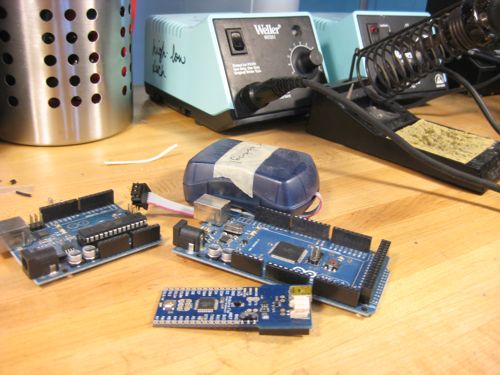
This is a list of the basic tools and components that provide the foundation for our electronics prototyping lab. See also our list of basic electronic parts for information about the resistors, LEDs, capacitors, etc. that we use. For other opinions, see the FabLab inventory.
Suppliers: Adafruit Industries [AF], SparkFun Electronics [SF], Digi-Key [DK]
This first section is general supplies for outfitting a lab.
Soldering
2 x Weller WES51 Soldering Station [DK]: quality soldering iron
10 x Replacement Tips (ETU, 0.15″) [DK]: a good fine tip
4 x Replacement Sponge [DK]
2 x Solder (Regular) [DK, SF]: for through-hole components
2 x Solder (Fine) [DK, SF]: for surface-mount components
5 x Solder Wick (Desoldering Braid) [DK, SF]
2 x Flux Pen [DK, SF]: for better solder connections and rework
1 x Brass Sponge w/ Base [SF]: for cleaning soldering iron tip
1 x Replacement Brass Sponge [SF]
Tools
5 x Diagonal Cutters [SF, DK]: for cutting wire
5 x Needle Nose Pliers [SF, DK]: always useful
5 x Tweezers [SF, DK]: good for SMD soldering
3 x Wire Strippers [SF, DK]: with holes for multiple gauges
1 x Vise [DK, SF]: for holding circuit boards while soldering them
1 x Solder Sucker [SF]
2 x Helping (Third) Hand: [SF]
1 x Calipers
3 x Knives
Instruments
1 x Oscilloscope [SF]
1 x Bench Power Supply [SF]
4 x Multimeters [DK, SF]: Digi-Key one is nicer and smaller; SparkFun one is cheaper.
2 x AVRISP mkII [DK]: for programming AVRs
Storage
Component Drawers (Plastic Small-Parts Drawer Cabinets) from McMaster-Carr, e.g. two or three of the 39-drawer cabinets.
Storage Bins from McMaster-Carr, e.g. Easy-to-Assemble Cardboard Bin Boxes or Stackable Plastic Bin Boxes.
This second section lists the per-student kit for an traditional Arduino class or workshop (as opposed to an e-textile workshop).
The easy option is to get a starter kit per student, e.g.: the Arduino Starter Kit [AF]. Another option is to buy components separately, like the ones suggested here.
1 x Arduino Uno: (the standard board)
1 x USB Cable (A to B) [ AF, SF, DK ]
For wire, per student either:
1 x Jumper Wire Kit [SF]: pre-stripped and cut wires, or
2 x Premium M/M Jumper Wires (10) [SF]: wires with header pins
For breadboards, per student either:
1 x Half Breadboard [AF] or
1 x Small Breadboard [SF]
Components:
5 x pushbutton
1 x potentiometer
2 x light sensor (LDR)
1 x tilt sensor
5 x 10K resistor (through-hole, 1/4W or 1/8W)
5-10 x LEDs of various colors (5 mm)
5-10 x 330 ohm resistors (one per LED)
1 x RGB LED
1 x servo motor
etc.
This third section lists additional supplies that are good to have on hand for an Arduino class or workshop. These quantities assume about 10 students; scale accordingly.
Alternative Arduino Boards
1 x Arduino Mega: (more memory and more pins)
1 x USB Cable (A to B) [ AF, SF, DK ]
1 x Arduino Micro (smaller and fits in a breadboard)
1 x Arduino Leonardo: (slightly cheaper and can emulate a mouse or keyboard)
1 x Arduino Due: (more powerful, 32-bit processor, faster, and more pins and memory)
3 x Micro-USB Cable [SF, DK]
Power
9V, Center Positive, 2.1 x 5.5 mm [ SF, AF ]: for driving high power loads
9V batteries
9V battery clip to 2.1 x 5.5 mm plug
Shields
Proto Shield Kit [AF] (plus Tiny Breadboard [AF])
Wave Shield Kit (or the full music and sound add-on pack) [AF]
AVR In-System Programmer
AVRISP mkII [DK]: for programming AVRs
Red, Black, and Green, 22 AWG, solid core
Sensors
Light Sensor (photocell) [ SF, AF ]: resistance varies based on the light on the sensor
ADXL322 Two-Axis Accelerometer (+/-2g) [SF]: see the Arduino tutorial
Ultrasonic Range Finder (Maxbotics LV-EZ1): accurately detect the distance of objects
PIR Sensor: [ SF, AF ]: for detecting that someone is moving in a room
Servos
regular [SF]: 180 degrees of rotation
full rotation [SF]: a geared motor
Wireless
XBee (Series 1) [SF]: easy-to-use, reliable wireless modules
XBee Explorer USB [SF]: connects XBee to computer
XBee Explorer Regulated [SF]: connects XBee to Arduino LilyPad, Pro, or Pro Mini
FTDI
(for programming Arduino LilyPad, Fio and Pro Mini):
FTDI Cable (5V) [ AF, SF ]: all-in-one cable
FTDI Basic Breakout (5V) [SF]: breakout board (requires Mini-USB cable)
FTDI Basic Breakout (3.3V) [SF]: breakout board (requires Mini-USB cable)
